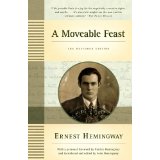
Today is the 50th anniversary of Ernest Hemingway’s death.
An article by Jeffrey Meyers in the Wall Street Journal on Hemingway’s literary achievement reminded me of that. He died, sadly by his own hand, on July 2, 1961.
I thought it would be a fitting tribute to share one of Hemingway’s insights into writing that really made a difference to me. For all the tumult in his personal life, he was an amazingly disciplined writer. I think much can be learned from his approach to writing.
One was his famous goal of achieving and logging a certain word count every day that he was working on a project.
This was before you just had to click “Word Count” in your word processing program! His steadfastness in his writing probably accounts for his steady output. As Jeffrey Meyers puts it, he “wrote at least one great work in every decade of his career.”
But what really made a difference to me in my own approach to writing is this insight he shares in his memoir of his years in Paris, A Moveable Feast:
“I had learned already never to empty the well of my writing, but always to stop when there was still something there in the deep part of the well, and let it refill at night from the springs that fed it.”
My standard approach, before I read this, was to write until I was exhausted. I used to write until I had said everything I wanted to say, until a certain chapter or point was completed. But during my first writer’s residence at the VCCA, I tried Hemingway’s approach. I found it worked much better, especially when you’re working, like I was then, on the first draft of a book-length manuscript:

Strange – I was just thinking of the Moveable Feast the past few days- and now you mention this excerpt. What a really good idea…it makes sense!
Thanks for the post!
Wow. Love that quote. It'll go in my "writing inspiration" notebook! Thanks for sharing.
that's great advice — thanks for sharing! in a recent writer's circle i participated in, we talked about ways to fill the well, but i love the idea of letting it regenerate from your own inspiration as another approach. thanks!
I never seem to run out of stuff to write although writing can and does exhaust me by the end of some days. Now, if I could only write as well as Papa…
Anjuli – I know you like that book!
Shelly – thanks!
Tia – I love the idea of your writing inspiration notebook!
Jenni – to me the important part was stopping to write when you know where you're going to pick up the next day. If you exhaust yourself, then it will be harder to start up again.
1FictionalReporter – yes, writing like Papa, now that would be something!
I found the quotation you shared interesting, especially since Hemingway seemed to live life to the extreme. Good advice for any writer. Old Man and the Sea is still one of my favorite books.
This is only tangentially relevant, but because of an article I read in Wired Magazine, I recently downloaded Marty Beckerman's politically incorrect book The Heming Way. While it's irreverent, it does cast an eye on the state of men into today's culture.
A useful principle I also have tried to follow from Papa. I'd kind of like to read the new version of A Moveable Feast which purportedly restores his intended structure vs. what his widow Mary did with it.
I've never read A Moveable Feast but now I want to read it, and also the one Don mentions, The Heming Way. I think the idea of ending the day before you're spent makes perfect sense, especially in terms of productivity. Moderation in all things, right?